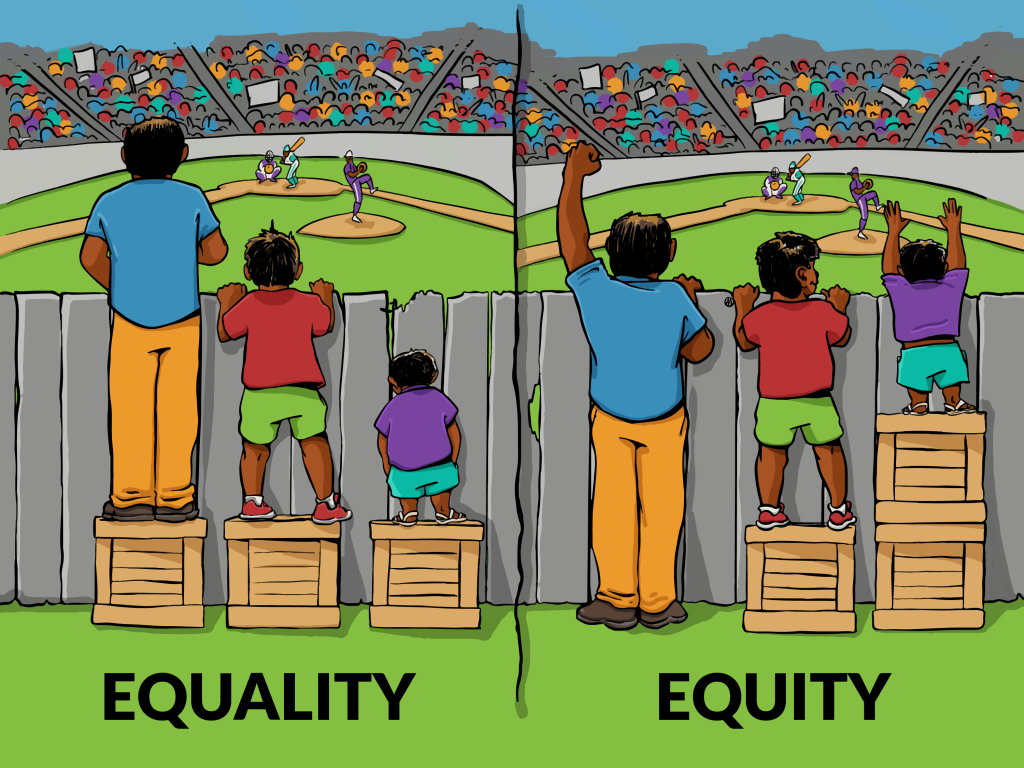Diversity in Groups
18 The Importance of Equity in Small Group Communication
AI generated content and edited by author
Introduction
In the context of small group communication, the concept of equity plays a pivotal role in ensuring that all members feel valued, heard, and empowered to contribute to the overall goal and mission of the group. Often, people confuse the term equity and equality. Equity differs from equality; while equality involves treating everyone the same, equity focuses on providing each individual with the necessary resources and opportunities to succeed based on their unique needs and circumstances. In a small group setting, particularly in a college course, fostering equity is crucial for effective collaboration, innovation, and learning.

Understanding Equity in Small Groups
Equity in small groups means recognizing and addressing the diverse backgrounds, experiences, and perspectives that each member brings to the group. Unlike equality, where uniformity is the goal, equity acknowledges that different individuals may require different levels of support to participate fully. This can include varying levels of knowledge, differing communication styles, or specific challenges related to accessibility and inclusion. In the small group assignments, it will be important to make clear distinctions between equity and equality. Fostering in-group decision making and open communication between group members will allow each individual to share their respective strengths and opportunities; this will ensure that the group fosters equity and each individual feels empowered to work in their strengths and improve their opportunity areas.
You will notice that college courses have varied demographics of student populations. You may have felt that your high school or workplace was diverse; yet, in college, you might notice even more diversity from an age, gender, sexuality, religious, socio-economic status, race, ethnicity, nationality, or physical/mental ability. It is important to note that many students in the classroom come to this space from all walks of life. These varied academic, cultural, and social backgrounds influence how they engage with group work. By ensuring equitable practices within the group, members can create an environment where everyone has an equal opportunity to succeed and contribute meaningfully.
The Impact of Equity on Group Dynamics
- Enhanced Participation and Engagement: When equity is prioritized, group members are more likely to feel comfortable sharing their ideas and opinions. This inclusivity leads to richer discussions and more diverse perspectives, which can enhance problem-solving and creativity within the group. For instance, quieter members who may need more encouragement to speak up will feel more empowered to contribute when they know their voice is valued.
- Improved Collaboration: Equity fosters a sense of trust and respect among group members. When everyone feels that their contributions are valued equally, the group is more likely to work together harmoniously. This collaborative spirit is essential for achieving the group’s goals and for creating a positive group dynamic that encourages mutual support and learning.
- Conflict Resolution: Inequities within a group can lead to misunderstandings, frustration, and conflict. By addressing these issues proactively, groups can prevent minor disagreements from escalating into major conflicts. Equitable practices encourage open communication and empathy, allowing members to resolve differences constructively.
- Greater Learning Outcomes: In a college setting, equitable group work can lead to better academic outcomes for all members. When students feel included and supported, they are more likely to engage deeply with the material and with each other. This leads to a deeper understanding of the subject matter and improved performance on group projects and assignments.

Strategies for Promoting Equity in Small Groups
- Setting Clear Expectations: At the outset, group members should establish norms that promote equity. This might include setting ground rules for respectful communication (the group charter is a great place to engage in these conversations), ensuring that all voices are heard, and being mindful of different communication styles and needs.
- Facilitating Inclusive Discussions: Group leaders or facilitators should actively work to include all members in discussions. This could involve directly asking quieter members for their input, rotating roles within the group to ensure everyone has a chance to lead, and being mindful of any dominant voices that may unintentionally overshadow others.
- Providing Resources and Support: Equitable groups recognize that some members may need additional resources or support to participate fully. This could involve offering additional time for tasks, providing access to necessary materials, or offering peer support for members who may struggle with certain aspects of the work.
- Reflecting on Group Dynamics: Regular reflection on group processes can help identify and address any issues related to equity. Group members should be encouraged to share their experiences and any concerns they have about the group dynamic. This reflection can lead to adjustments that improve the overall equity and effectiveness of the group.
Equity is a foundational principle in small group communication that ensures all members have the opportunity to contribute, learn, and succeed. In a small group setting, promoting equity within a group leads to better group dynamics, more effective collaboration, and improved learning outcomes. By understanding and implementing equitable practices, group members can create an inclusive environment where everyone’s contributions are valued and respected.

